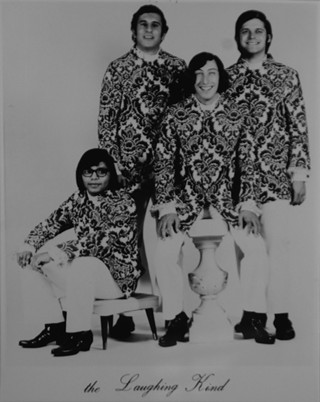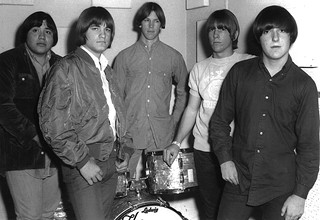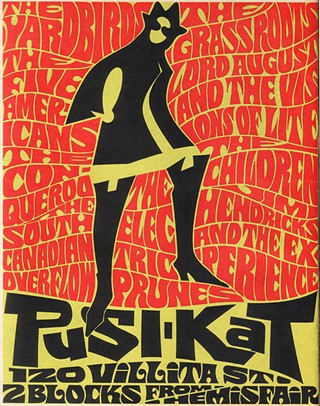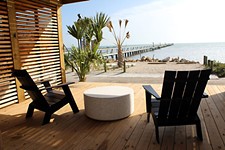My Children Are Becoming Heavy
A tale of two cities in the 1960s
By Margaret Moser, Fri., Aug. 26, 2011
"My children of tomorrow are becoming heavy," sighs the state of Texas personified, a woman resting her hands on the shoulders of her favorite sons, San Antonio and Austin.
An illustrated flyer by Dan "Boogie" Winans for a concert at San Antonio's landmark Sunken Garden Theater on July 21, 1969, it's a ground-zero image of Texas rock and rare evidence of a time when the Alamo City scene was so powerful that Austin bands regularly surfed south on the interstate pipeline that is I-35.
San Antonio trumping Austin as the place to play in this part of Texas is a radical notion, especially here, with our rah-rah slogans, hugely popular festivals, and peerless cachet. Yet in '69, the Vulcan Gas Company, Austin's answer to San Francisco ballrooms the Fillmore and Avalon, was barely two years old and went under as the Armadillo World Headquarters opened in 1970.
The musicians that passed through the Vulcan – the Velvet Underground, Jimmy Reed, Johnny Winter, Moby Grape, Big Mama Thornton, the Fugs – existed on the fringe of popular music, as did University of Texas campus shows featuring Ike & Tina Turner and Bob Dylan. That niche ultimately made Austin a Southwestern destination spot, but at that moment in time, the capital scene was still fringe.
Not only did San Antonio best Austin as the rock & roll destination in the 1960s, but its influence also followed Highway 90 east to the Gulf Coast, was carried west on the radio waves halfway to El Paso, and ruled South Texas to the Valley.
Mother Texas was right.
Hot Smoke & Sasafrass
Despite the tomes written about it and a vast, genuine claim to every genre of music, Texas gets shortchanged in rock history. Doug Sahm and the 13th Floor Elevators are inexcusably absent from the Rock and Roll Hall of Fame. Conventional music wisdom holds the Beatles as the model for popular bands writing and performing their own material, but the Fab Four would be the first to credit Buddy Holly & the Crickets in both name and concept. Producer Manny Guerra might not even qualify as a footnote, but his decision to switch from accordion to organ in bands like Sunny & the Sunglows imprinted garage rock with its distinctive keyboard edge.
San Antonio feeds this historical dead zone but remains the missing piece in Lone Star music history. Long marginalized for its metal mania, San Antonio's legendary affinity for that genre stakes its claim from having been the powerhouse city for touring bands in South Texas in the 1960s, an axis of cool that shifted to Austin in the 1970s. That's a far cry from 1956 San Antonio, where, reported Time magazine, "rock 'n' roll was banned from city swimming-pool jukeboxes because, said the city council, its primitive beat attracted 'undesirable elements' given to practicing spastic gyrations in abbreviated bathing suits."
Boasting the Rolling Stones' first tour of the U.S. among its credits, plus three Jimi Hendrix shows, Blind Faith's only American tour, Led Zeppelin, the Yardbirds, etc., San Antonio between 1967 and 1971 made it so that bands touring the area never even considered stopping in the hip college town 80 miles north. The British Invasion birthed an explosion of garage rock out of South Texas bands so visceral that Zakary Thaks' "Bad Girl" was included in garage rock blueprint Nuggets: Original Artyfacts From the First Psychedelic Era, 1965-1968. San Antonio acts the Outcasts, the Laughing Kind, and a doo-wop quartet known as the Commands charted locally, and in 1965, two white boys and three Mexicans known as the Sir Douglas Quintet ran "She's About a Mover" up the national flagpole.
Austin couldn't generate all the bands needed for the Vulcan Gas Company. Houston's Fever Tree and Red Crayola played there, but almost no Dallas bands did. A local teen named Roky Erickson fronted a popular quintet called the 13th Floor Elevators, and Shiva's Headband, the Golden Dawn, and South Canadian Overflow performed often, yet Austin depended on San Antonio talent for new blood. And S.A. donated willingly: Charlie Prichard made his way up to Austin and joined the Conqueroo. In one of the Vulcan's iconic Gilbert Shelton posters – the one with the brain that spells "pot" in the middle – the Elevators headlined a three-night stand with San Antonio's Swiss Movement, who'd scored as opener for Jimi Hendrix's first San Antonio concert.
A few boasted dual citizenship: Bubble Puppy, claimed by San Antonio and Austin (and Houston and Corpus Christi), couldn't be penned in, jumping to the charts in 1969 with "Hot Smoke & Sasafrass," the same year the Sir Douglas Quintet recharted with "Mendocino." In addition, the 13th Floor Elevators' Easter Everywhere-era rhythm section lived in San Antonio.
Mother Texas smiled.
Through the Past Psychedelically
Even the Vulcan's visual identity had San Antonio roots. Jim Harter drew many of the Vulcan's early posters, and Don Evans, who played with the Water Brothers and later Ultra, contributed fliers for the club. This arc continued into the 1970s with artists like John Rogers, also of the Water Brothers, and Jose Carlos Campos drawing posters for the Armadillo World Headquarters. The Armadillo's commitment to posters for its concerts created a sense of continuity even among diverse genres. Those images preserve a graphic history of Texas music that dazzles through the past psychedelically.
San Antonio counterculture had its own artistic identity too, briefly in the 1960s, but without community, the identity died, the names forgotten except for a few Internet references by those in the San Antonio know. Every subsequent scene and musical trend in San Antonio spawned its own graphic talents, especially punk, but with the communal support missing for this part of its past, the images – posters, photographs, memorabilia – remain specific to the bands and clubs, rather than San Antonio's sense of its own musical history.
Dan "Boogie" Winans was a fixture in San Antonio's counterculture scene as co-proprietor (with his brother Charles) of Grandma's Tea House, a local head shop. His pen-and-ink fliers for Sunken Garden shows, renderings of psilocybin mushrooms and acid dreams, gave San Antonio's potent 1960s rock scene a look as identifiable as Jim Franklin's armadillos are to Austin's 1970s. Heavily influenced by Robert Crumb's inky style, they're deliberately busy and done so as to deflect establishment scrutiny, each one loaded with such youthful expressions of artistic joy and childlike wonder that Winans comes across today as a psychedelic folk artist.
Winans' art also catalogs the bands that played, not only at Sunken Garden but at the Mind's Eye – Lord August & the Vision of Light (with Doug Sahm muse Augie Meyers), Rachel's Children, and the Rubyyat among others. Most of the fliers were incidental expressions of pop culture, yet the sentiment of Mother Texas declaring "my children of tomorrow are becoming heavy" is deep and resounding.
"Austin and San Antonio are getting together at the Sunken Gardens Theatre," the drawing announces happily, illustrated with unmistakable glee at the very idea.
Heavy Makes You Happy
Mother Texas had no way of knowing how prescient her words were. Despite musical growth, the culture of fear and surveillance described by the 13th Floor Elevators in Austin in the late 1960s (see "High Baptismal Flow," Aug. 13, 2004) was more enforced in San Antonio. Those that didn't get caught in the draft or flee for California applied to UT and moved to Austin or attended other colleges elsewhere in Texas. Only the hardy stayed in San Antonio, and that fortitude dovetailed into a love affair with a music that goes to 11 and beyond – heavy metal.
Austin wasn't just the refuge from San Antonio or a place to go to school. Young people flocked here in the 1970s; whole bands and scenes moved en masse, including a uniquely talented musical crowd from Dallas that included Jimmie and Stevie Ray Vaughan, and artistic immigrants from Houston including Bill Narum and Kerry Awn. San Antonio's favorite son, Doug Sahm, now twice on the cover of Rolling Stone, fled for California after his bust but was drawn back to Texas and Austin, where his face and music became legend.
San Antonio has forgotten much of its own history and its place in 1960s music because of its lack of visuals and a presence in the underground press, both primary sources of memory. Its admittedly limited poster art exists to a large degree in private collections, yet hasn't been archived or collected with much interest. Its current poster scene is wielded almost single-handedly by Jerry Clayworth's retro style, but for the first time in some four decades, with a nod to 1970s punk, San Antonio's visual expression reflects a vibrant rock music scene.
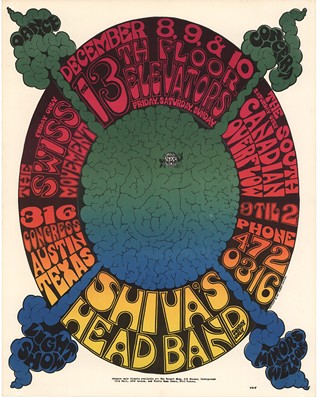
And considering how San Antonio rightfully built its musical repute as the Tejano capital of the world while still rocking & rolling, Mother Texas should be proud.
A Few 1960s S.A. Names To Know
Chris Geppert
Dropped out of Alamo Heights High School, which at the time had rules against long hair, and played in the popular rock band Flash before moving to Austin and becoming the Grammy-, Golden Globe-, and Oscar-winning Christopher Cross.
Chris Holzhaus
Played blues and rock guitar in numerous S.A. bands, including the Laughing Kind, the Eastwood Revue, Augie Meyers & the Western Head Band, and many more. Holzhaus recorded "Farmer John" with the Argyles on Huey Meaux's Pic 1 label in 1966.
Gene Kurtz
Also attended Alamo Heights High School and played in the Rolling Stones (not those Stones!) before writing "Treat Her Right" for Roy Head. His lengthy career as a bassist, singer, and songwriter includes a recent stint playing bass with Dale Watson.
Mike Nesmith
Stayed in San Antonio after his Air Force stint and attended San Antonio College, where he was active in the folk scene. He performed regularly at the Teen Canteen in its Wonderland Mall location in a folk act before leaving for California to star in The Monkees.
Galen Niles
Was the go-to guitarist for such bands as the Outcasts. In the late 1960s, he joined Homer, a group noted for its rip-rock recording of the then-unknown Willie Nelson song "I Never Cared for You." Niles later joined hard-rock outfit Ultra and opened for the Sex Pistols at Randy's Rodeo in San Antonio.
Steve Perron
Came from a musical San Antonio family and played guitar in the Argyles with Chris Holzhaus, then with the Children. Perron, who died in 1973, penned a song called "Francine" for the Children, later recorded by an upstart Texas trio known as ZZ Top.
Cassell Webb
Was lead singer for the Children, who left San Antonio in the late 1960s to record for Lou Adler in Los Angeles. After working as a session singer, Webb moved to Europe in the 1980s and embarked on a solo career, recording and producing with partner-producer Craig Leon.
Texas Legacy Music Awards
On Sunday, Sept. 4, the first Texas Legacy Music Awards celebrates the best of South Texas music from the 1960s at Floore's Country Store, 4pm. Tickets are $17.50 in advance and $20 at the door, available at www.liveatfloores.com and all Planet K locations.
4pm: Texas Legacy Honors
5pm: Swiss Movement
5:45pm: The Outcasts
6:30pm: Stone Soul Clique with Zakary Thaks
7:15pm: Laughing Kind
8:00pm: Ultra
8:45pm: Bubble Puppy
9:30pm: Pusikat Jam with Westside Horns






